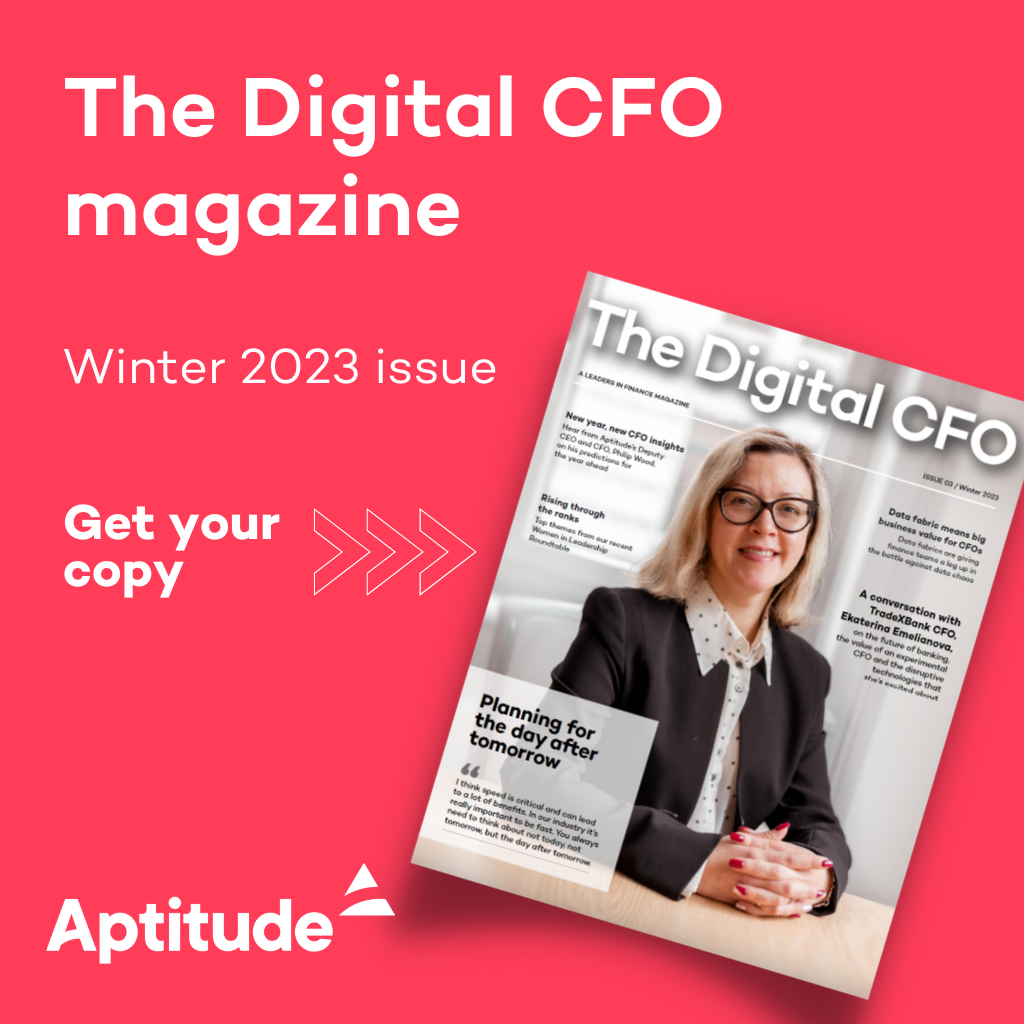Previously published in The Digital CFO magazine (Winter 2023)
As the recently named CFO of TradeXBank, a Commodity Trade Finance (CTF) bank based in Zurich, Ekaterina Emelianova is putting her 20 years of finance experience to work defining the direction and strategy of the organization. She spoke with Christophe Kasolowsky, Aptitude’s Chief Product Officer, on the future of banking, the value of an experimental CFO and the disruptive technologies that she’s excited about.
Christophe: So, let’s start with the question we’ve asked our previous interviewees for this feature and that is, what is a Digital CFO? What does that phrase mean to you?
Ekaterina: Today, a CFO cannot be successful without being very close to all things digital and to new technologies. I’ve watched our profession change tremendously thanks to technology.
In the past, the CFO was a bookkeeper, let’s face it. We were looking back. But you can’t drive a car if you are always looking in your rearview mirror. In the absence of technology, CFOs are stuck looking backwards and not able to act as a business partner – a sparring partner – and not able to help the business and the board.
Today it’s one crisis after another but technology and digitalization are enablers for the CFO. We’ve got real time financials, real time management reporting – or close to real time – and we’re able to deliver insights and make decisions. I firmly believe that if you can’t measure, you can’t manage. Now you can better measure, thanks to technologies, and better manage as a result.
Christophe: I agree, the finance function has absolutely come a long way and there is a digital element that is now mandatory, but the reality is plenty of CFOs still feel like too much of their time is spent on manual tasks or backwards reporting. What would you advise these CFOs, who may be lagging a bit in terms of defining a finance technology architecture? Where do they start?
Ekaterina: It’s quite difficult to start! But what I would suggest is don’t try to do some large, big, costly project and don’t try and onboard unproven technology. Start with the basics.
For example, all companies have employee expense management requirements, and the market is full of proven, easy-to-introduce solutions that leverage robotics and artificial intelligence. Improvements in this area will be felt by the whole organization since employee expense processes touch a significant portion of a company and this can be great from an internal PR perspective.
Then move to accounts payable or another relatively easy area. Before you know it, it’s like an appetite. You brought your company to a restaurant when they weren’t hungry but once they started eating they want more.
Christophe: What does success look like for these smaller projects? Is it about speed? Better performance? Lowering costs?
Ekaterina: I think speed is critical and can lead to a lot of benefits. In our industry it’s really important to be fast. You always need to think about not today, not tomorrow, but the day after tomorrow. Your ability to move quickly takes priority over cost reduction when you think about these programs, in my opinion. And when you talk about these technology projects as cost reductions, I think it’s important to look at how and what you are measuring. You can’t just look out one year. You need to have some horizontals – three years, five years – and then you need to see what the cost reduction looks like over the long term. No one should make decisions just by looking to reduce costs in one year. You will never achieve anything.
I also think CFOs need to really look at the problem they are trying to solve when they measure the cost savings of these technology projects. For example, today it’s very difficult to hire finance professionals because we’ve got a younger generation that thinks finance is boring, repetitive. You can’t attract talent if you’re saying to your star performer that every day they have to do the same
thing. So, from that standpoint, if you bring in the technology that automates the repetitive work, enables finance to do something transformative and allows you to attract and retain the right talent as a result, you have solved your problem and likely reduced costs in the long run.
For me, at a high level, I think the CFO role should be completely different from the person who knows debits and credits and understands the regulatory standards by heart. The CFO role should be filled by a strategic, experimental person. In this role, you’re not a manager anymore. You are a mentor and a coach.
Christophe: Let’s talk about Banking specifically for a moment. You’ve been in the Banking sector for a long time, currently as the CFO of TradeXBank. Where do you think the role of the CFO is going more generally for Banks and Financial Services institutions? What do they need to think about to be successful in the next 5-10 years over and above the technology agenda?
Ekaterina: I believe classical banking will not last for long. And I still believe that the movement to an ecosystem is really the right move. To navigate these shifts, Banking CFOs need to think broad. They need to understand M&A, the Fintech technology landscape, how to evaluate investments and what types of services to offer. They also need to understand how to calculate the cost of their services which can be difficult in financial services. In manufacturing, it’s pretty easy, right? But how you calculate cost of services in the banking and financial services industries, it’s not easy. We need CFOs that can play a much more important role in the strategy and have a better understanding of market development. For me, at a high level, I think the CFO role should be completely different from the person who knows debits and credits and understands the regulatory standards by heart.
The CFO role should be filled by a strategic, experimental person. In this role, you’re not a manager anymore. You are a mentor and a coach. Your team is not calculating math equations, but instead posing and proving hypotheses. It’s analyzing investments and technologies and developing math models with all their dependencies. But on top of all that, actually, I believe that the most important skills for this CFO role are storytelling, negotiation and conflict resolution. I’ll give you an example. At TradeXBank, one of the things I’m trying to do with my team is to take all the financial reporting and information they’ve prepared and try to understand and articulate the message in a way that tells a story to leadership. We spend enormous amounts of effort on that, and I think it needs to be a critical part of the strategic CFO’s role going forward.
Christophe: What has caught your attention in terms of new technologies for the Banking sector and what do you think will be the most disruptive and
interesting for your organization and the finance sector in general?
Ekaterina: Well, my particular world is commodity trading and areas of finance related to that. For us, digitization is really a game changer for everyone as we try to deal with the high volume of papers and the constant flow of information to and from our clients. Now we’re considering how we can create a digital journey for our clients that also benefits us. We expect this to reduce our costs and speed up the flow of information. And by having all this data available to us, we can generate more forecasting and analytics. It’s not an option not to be digital – the question is just how we’ll construct this digital journey for our clients and for us. Shall we start receiving voice recognition instructions from clients? How shall we exchange documents? We’re asking those types of questions.
The next would be artificial intelligence and machine learning – I think you referred to it as predictive analytics. I think this is one of the keys for everyone, especially these days. We all know the next crisis is around the corner. What we don’t know is when, we don’t know how severe, and we don’t know what shape it will take. In order to be prepared, you need to be able to model a lot of scenarios. When something happens, people are so stressed it’s hard to think rationally. If you have already modeled certain scenarios and know your desired response, you don’t need to call for a meeting to discuss what you’re going to do. You know how to act based on certain triggers and I think that’s one of the most important things for us and for Banks in general.
Christophe: I know you are the President of the IMA Swiss Chapter. Can you share a bit more about what you provide your members and your top focus area in that role?
Ekaterina: The Institute of Management Accountants (IMA®) has been around for over 100 years It is one of the largest and most respected associations focused exclusively on advancing the management accounting profession with 150k members globally. The key for me is to give members support and guidance in their professional careers. In this profession, things change every day so we are trying to help management accountants, CFOs, controllers and other finance professionals to find the solution to their problems, gain additional knowledge and stay up to speed on the latest best practices. Given our conversation, you won’t be surprised to know that one of our hot topic issues is technology.
This year for the first time we ran a webinar on artificial intelligence which was such a success that we’re planning to add more. We also cover topics around ethics, core leadership skills and talk about how to manage stress and burnout. Our Swiss Chapter is 300 members and we’re working closely with IMA organizations globally to grow our membership. I’m really proud of our chapter because we really managed to organize a lot of interesting events and have a strong pipeline for 2023 to discuss the priorities
of our members.
Christophe: Thank you for sharing your insights and expertise, Ekaterina!



